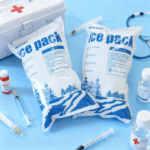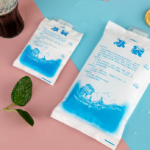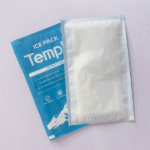Rapid Freeze Dry Ice Packs: Revolutionizing Cold Chain Logistics
In the ever-growing cold chain logistics industry, ensuring the safe and efficient transport of temperature-sensitive goods is more crucial than ever. Rapid freeze dry ice packs have become an essential tool for businesses in sectors such as pharmaceuticals, food, and biotechnology. These cooling packs provide extended cooling durations, enhance product safety, and are environmentally friendly, positioning them as the ideal solution for modern cold chain challenges.

-
How do rapid freeze dry ice packs work to maintain ultra-low temperatures?
-
What are the key benefits of using dry ice compared to traditional cooling methods?
-
How can rapid freeze dry ice packs improve cold chain efficiency and reduce costs?
-
What are the latest trends in 2025 shaping the future of cold chain logistics?
How Do Rapid Freeze Dry Ice Packs Work?
Rapid freeze dry ice packs are made from solid carbon dioxide (CO₂), which sublimates (turns from solid to gas) at a temperature of -78.5°C (-109.3°F). This property allows them to maintain extremely low temperatures for extended periods without leaving any liquid residue. Unlike traditional ice packs that melt into water, dry ice sublimates directly into gas, ensuring that sensitive products are kept at the required temperature without the risk of water damage.
For instance, when used in pharmaceutical shipments, dry ice ensures that vaccines and biologics remain stable and effective during transport, preserving their integrity. This is essential for industries that require stringent temperature control to meet regulatory standards.
Why is Sublimation a Key Advantage?
The sublimation process of dry ice absorbs a significant amount of heat, allowing it to maintain low temperatures without the need for liquid water. This unique characteristic makes dry ice far more effective than gel or water-based ice packs, especially for shipments that need to stay at temperatures far below freezing.
For example, pharmaceuticals and biologics need ultra-low temperatures to maintain their potency. Traditional ice packs and gel packs are typically limited to temperatures between 0°C and 4°C, while dry ice can keep items frozen for up to 72 hours at temperatures well below freezing, which is critical for longer shipments or in warmer climates.
How Do Rapid Freeze Dry Ice Packs Compare to Traditional Cooling Methods?
Dry ice offers several advantages over traditional cooling methods, such as gel packs and liquid ice. Below is a comparative analysis of these cooling options:
| Feature | Rapid Freeze Dry Ice Packs | Traditional Ice Packs |
|---|---|---|
| Temperature Range | -78.5°C (-109.3°F) | 0°C to 4°C |
| Cooling Duration | Up to 72 hours | 6–12 hours |
| Residue | None | Water |
| Reusability | Single-use | Reusable |
| Best Use Cases | Pharmaceuticals, Biotech, Frozen foods | Chilled food, beverages, and less sensitive goods |
As you can see, rapid freeze dry ice packs are far superior when it comes to maintaining ultra-low temperatures over extended periods. They are ideal for sensitive products such as vaccines, biotech samples, and frozen food, which require precise temperature control to ensure safety and quality upon delivery.
Key Benefits of Using Rapid Freeze Dry Ice Packs in Cold Chain Logistics
1. Extended Cooling Duration
Unlike traditional ice packs, dry ice can maintain temperatures for 24 to 72 hours, depending on the quantity used and insulation quality. This reduces the need for frequent replacements and ensures that temperature-sensitive products are kept safe throughout the shipping process.
2. Improved Efficiency and Product Integrity
By providing a consistent cooling environment, rapid freeze dry ice packs help prevent product degradation. For instance, pharmaceuticals that need to be kept at sub-zero temperatures benefit from the steady cooling that dry ice offers, which preserves their efficacy.
3. Reduced Environmental Impact
Unlike traditional ice that melts into water, dry ice sublimates without leaving waste behind, making it a cleaner, more sustainable option. Many businesses are now focusing on reducing environmental impact, and using dry ice is one way to achieve this, especially when combined with eco-friendly packaging materials.
4. Cost-Effectiveness
While the initial cost of dry ice may be higher, its longer cooling duration can reduce overall transportation costs by minimizing the need for multiple replacements. Moreover, the absence of melting water reduces the risk of damage to goods, which can lead to fewer claims and lost products, further lowering costs.
Practical Usage Tips for Maximizing Dry Ice Performance
To maximize the efficiency of dry ice in cold chain logistics, consider the following tips:
-
Pre-cool Containers: Before adding dry ice, ensure the shipping container is cool to prevent the dry ice from wasting energy cooling down the container itself.
-
Layering Method: Use the “sandwich” method where a layer of dry ice is placed at the bottom and top of the cargo, with the product placed in the middle. This ensures even cooling throughout the shipment.
-
Ventilation: Since dry ice sublimates into CO₂ gas, it’s essential to ensure proper ventilation in the packaging to prevent pressure build-up and potential hazards.
-
Safety Measures: Always handle dry ice with insulated gloves and store it in well-ventilated areas to avoid frostbite and asphyxiation.
2025 Trends in Cold Chain Logistics: The Role of Rapid Freeze Dry Ice Packs
As we move into 2025, the cold chain logistics sector is embracing technological advancements that make shipping more efficient, cost-effective, and sustainable. Rapid freeze dry ice packs are at the forefront of these innovations. Here’s a look at the trends influencing the industry:
1. AI-Powered Temperature Management
Artificial intelligence is now being used to monitor temperature and humidity in real-time. AI-powered sensors help optimize the amount of dry ice used in shipments, ensuring that products are kept within the required temperature range. This technology can also predict temperature fluctuations and adjust shipments accordingly, reducing spoilage.
2. Smart Packaging and IoT Integration
Smart packaging solutions that integrate IoT sensors are becoming more common. These sensors allow for real-time monitoring of temperature and humidity during transit, ensuring that dry ice is performing optimally throughout the journey.
3. Sustainability Initiatives
Sustainability is a growing concern in the cold chain industry, and dry ice production is becoming more eco-friendly. Companies are using captured CO₂ for dry ice production, which reduces its carbon footprint. Additionally, sustainable practices like using biodegradable packaging materials and reusable insulation are becoming more common.
Frequently Asked Questions
Q1: How long do rapid freeze dry ice packs last during transportation?
Dry ice typically lasts between 18 and 24 hours, depending on the amount used and the insulation quality. In well-insulated packaging, it can last up to 72 hours.
Q2: Can rapid freeze dry ice packs be reused?
No, dry ice is a single-use refrigerant because it sublimates completely during transit. However, the insulated containers and additional materials used for packing are reusable.
Q3: Are rapid freeze dry ice packs safe to handle?
Yes, but they should be handled with care. Use insulated gloves to prevent frostbite and ensure proper ventilation when storing or transporting dry ice to avoid CO₂ buildup.
Conclusion and Recommendations
Rapid freeze dry ice packs offer a superior solution for cold chain logistics, particularly when transporting ultra-sensitive goods like pharmaceuticals, biotech samples, and frozen food. Their ability to maintain low temperatures for extended periods, combined with their environmental benefits, makes them a valuable asset to any business in the cold chain sector.
Next Steps
To optimize your cold chain logistics, consider integrating rapid freeze dry ice packs into your transportation strategy. Evaluate your cooling methods, assess how dry ice can help reduce costs, and ensure that you follow safety and regulatory guidelines.
About Tempk
At Tempk, we specialize in providing innovative cold chain solutions. Our rapid freeze dry ice packs are designed for reliability, efficiency, and sustainability. We help businesses in pharmaceuticals, food, and biotech improve their logistics with cost-effective and eco-friendly solutions.
Call to Action
Contact us today to learn how Tempk can help you streamline your cold chain logistics with our advanced dry ice solutions.























